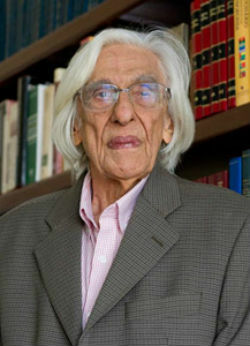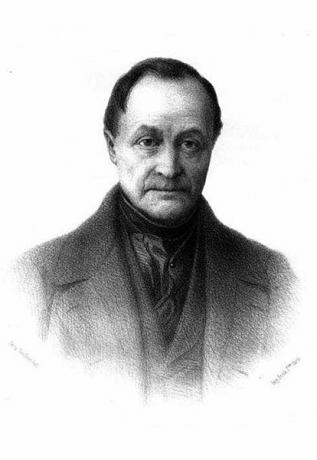Ferreira Gullar was a poet, journalist, art critic and precursor of the neoconcrete movement in Brazil.
Through an experimental, radical and engaged literature, Gullar is considered one of the greatest Brazilian writers of the 20th century.
He was part of the Brazilian Academy of Letters (ABL) from 2014, being the seventh occupant of Chair No. 37.
Biography

José de Ribamar Ferreira was born on September 10, 1930 in the city of São Luís, in Maranhão. He was the son of Newton Ferreira and Alzira Ribeiro Goulart.
There he lived part of his childhood and adolescence. As a young man, he revealed his interest in literature and decided to become a poet.
He decided to adopt the name he created: Ferreira Gullar. His artistic name represents the union of his parents' surnames, and also the change in the spelling of Goulart, belonging to his mother. In the words of the poet: “How life is invented I invented my name”.
At just 19 years old, in 1949, he published his first work entitled: “a little above the ground”. In Maranhão he was a collaborator and founder of the “Ilha” magazine.
In the early 1950s, Gullar moved to Rio de Janeiro and became involved with the vanguard movement of concretism. THE concrete poetry it was produced taking into account the sound and visual effects.
In the marvelous city he worked in the magazines “O Cruzeiro” and “A Manchete”, and also in the newspapers: “Jornal do Brasil” and “Diário Carioca”.
In the late 1950s, Gullar left the concretism and founds a new movement: Neoconcretism. Alongside Lygia Clark and Hélio Oiticica, the Neoconcretism arises in Rio de Janeiro, in opposition to the ideals of the concrete current in São Paulo.
He was the one who wrote the “Neoconcrete Manifesto”. The text was read at the “I Exhibition of Neoconcrete Art”, at the Museum of Modern Art in Rio de Janeiro, in 1959.
“Neoconcrete, born out of a need to express the complex reality of modern man within the structural language of the new plastic, denies the validity of scientific and positivist attitudes in art and redress the problem of expression, incorporating the new “verbal” dimensions created by non-figurative art constructive. (...) We do not conceive the work of art neither as a “machine” nor as an “object”, but as a quasi-corpus, that is, a being whose reality is not exhausted in the external relations of its elements; a being that, decomposable into parts by analysis, only gives itself fully to the direct, phenomenological approach.”
In addition to the Neoconcrete Manifesto, at that time Gullar wrote one of his most important theoretical essays: “non-object theory”.
He joined the communist party and had to go into exile in other countries during the dictatorship. When the 1964 military coup occurred, Ferreira was part of the Popular Center for Culture (CPC) of the UNE (National Union of Students), founded in 1961.
He lived in Moscow, Santiago de Chile, Lima and Buenos Aires from 1971 to 1977. During his exile in the Argentine capital, he wrote one of his most emblematic works, “dirty poem”.
When he returned to Brazil, Ferreira was arrested and tortured by the DOPS (Department of Political and Social Order). After his release, he continued to work for newspapers in Rio de Janeiro. He also collaborated as a television screenwriter and playwright (Teatro Opinião).
In 2002 he was nominated for the “Nobel Prize for Literature”. He was awarded twice with the “Prêmio Jabuti” (2007 and 2011), the most important literary award in Brazil.
In 2010, Gullar received the “Prêmio Camões”, the most important in Portuguese-language literature. In 2014 he was elected a member of the Brazilian Academy of Letters (ABL).
Gullar died on December 4, 2016 in Rio de Janeiro, aged 86, from pneumonia.
His last text as a columnist for Folha de São Paulo was published on the day of his death: “What does someone need to have millions of dollars at their disposal?”
“And, by the way, what does anyone need to have millions and millions of dollars at their disposal? To dine out in the gut? If he invests that money in a company, creating it well and giving people jobs, that's fine. But no one needs ten luxury cars, twenty country houses, or dozens of lovers.
Such fortunes should be shared with other social classes, invested in the cultural and professional formation of the disadvantaged people, used to subsidize hospitals and institutions to care for the elderly and needy.”
Construction
Gullar was the owner of a vast literary work. He wrote poems, short stories, chronicles, essays, memoirs, biographies, dramaturgy, reviews, and even translated. His main works are:
- A little above the ground (1949)
- The wrestling (1954)
- Poems (1958)
- Non-Object Theory (1959)
- João Boa-Morte, Goat Marked to Die (1962)
- Culture called into question (1964)
- Into the Fast Night (1975)
- Dirty Poem (1976)
- A light on the floor (1978)
- In the vertigo of the day (1980)
- About art (1984)
- Stages of Contemporary Art (1985)
- Noises (1987)
- Today's inquiries (1989)
- Argument against the death of art (1993)
- Many voices (1999)
- A cat named kitten (2005)
- Grumbling (2007)
- Nowhere (2010)
- Poetic autobiography and other texts (2016)
poems
To better understand the writer's language, check out some of his most outstanding poems below:
Dirty Poem (Excerpt from the work)
cloudy cloudy
the cloudy
blow hand
against the wall
dark
less less
less than dark
less than soft and hard less than ditch and wall: less than hole
dark
more than dark:
clear
Like water? how feather? clear more than clear clear: nothing
and it all
(or almost)
an animal that the universe manufactures and has been dreaming from its entrails
blue
it was the cat
blue
it was the cock
blue
the horse
blue
your ass
translate
A part of me
it's everybody;
another part is nobody:
bottomless background.
A part of me
it's crowd:
other part strangeness
and loneliness.
A part of me
weighs, ponders;
Other part
delirious.
A part of me
lunch and dinner;
Other part
is amazed.
A part of me
it is permanent;
Other part
you suddenly know.
A part of me
it's just vertigo;
Other part,
language.
Translate a part
in the other part
— which is a question
of life or death —
is it art?
No Vacancies (Example of Social Poetry)
the price of beans
it doesn't fit in the poem. The price
of rice
it doesn't fit in the poem.
Gas doesn't fit in the poem
the light the phone
the evasion
of milk
of the meat
of sugar
of the bread
the civil servant
it doesn't fit in the poem
with your hunger salary
your closed life
in files.
As it doesn't fit in the poem
the worker
that grinds your day of steel
and coal
in the dark workshops
- because the poem, gentlemen,
it is closed:
"no vacancies"
It only fits in the poem
the man without stomach
the woman of clouds
the priceless fruit
The poem, gentlemen,
doesn't stink
doesn't even smell
Blue Sea (Example of Neoconcrete Poetry)
blue sea
blue sea blue landmark
blue sea blue landmark blue boat
blue sea blue landmark blue boat blue bow blue
blue sea blue frame blue boat blue bow blue air blue
Sentences
- “Art exists because life is not enough.”
- “I know life is worth it even if bread is expensive and freedom is small.”
- “In the face of life's unpredictability, we invent God, who protects us from the stray bullet.”
- “The splendor of the mornings, the smell of rotten tijuco, the mud, it's all impregnated in my poetry.”
Read too:
- social poetry
- The Language of Modernism
- Characteristics of Contemporary Brazilian Literature
- Modern and contemporary Brazilian poets

